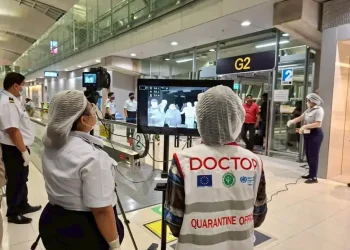Chagas Disease Declared Endemic in the U.S. as Experts Call for Greater Awareness
Published Time: 09-17-2025, 14:30 EDT
Chagas disease, a potentially deadly illness spread by insects known as “kissing bugs,” is now considered endemic in parts of the United States, according to infectious disease experts. A new report urges health officials to recognize the growing presence of the parasite-driven illness to avoid preventable suffering.
What the New CDC Report Reveals
A recent study published in the U.S. Centers for Disease Control and Prevention (CDC) journal Emerging Infectious Diseases highlights the urgent need for increased surveillance, testing, and prevention of Chagas disease in the U.S.
Dr. Norman Beatty, a coauthor of the study and clinical associate professor at the University of Florida’s College of Medicine, said the recognition is long overdue.
“We’ve been waiting forever; all of us Chagas people have been waiting for people to recognize this disease is in our communities,” Beatty said.
The World Health Organization classifies Chagas as a neglected tropical disease. It is already considered endemic in 21 other countries across the Americas, but until now, the U.S. had not officially acknowledged its presence.
How Chagas Spreads
Chagas disease is caused by the parasite Trypanosoma cruzi, which is carried by triatomine insects, commonly called kissing bugs. These insects typically bite humans while they sleep. When the bug defecates near the bite or face, the parasite enters the body if the person accidentally wipes the feces into their mouth, eyes, or a wound.
Transmission can also occur through:
- Contaminated food or drink
- Blood transfusions or organ transplants
- Mother-to-child transmission during pregnancy
Early symptoms may include fever, body aches, headaches, rash, vomiting, and fatigue, which can last weeks or months. If untreated, 20–30% of cases progress to severe conditions, including heart failure, digestive problems, stroke, or even death.
Treatment Challenges in the U.S.
Two antiparasitic drugs—benznidazole and nifurtimox—can cure the disease if administered early. However, effectiveness decreases as the infection progresses, and many patients remain undiagnosed for years.
Dr. Beatty noted that most U.S. doctors are unfamiliar with Chagas and do not routinely test for it, even in areas where kissing bugs are present. Many cases are only discovered during routine blood donation screenings.
Chagas Cases in the U.S.
According to CDC estimates, about 280,000 people in the United States are currently living with Chagas disease. Surveillance remains limited, making it difficult to know how many develop life-threatening complications.
Scientists have confirmed kissing bugs in 32 states, particularly in the South, where warmer climates allow the insects to thrive. Climate change may be further expanding their range.
Infected mammals—including raccoons, opossums, coyotes, skunks, and armadillos—have been found in at least 17 states, serving as natural reservoirs for the parasite. Veterinarians have also identified cases in domestic pets such as cats, dogs, and even zoo animals.
Doctors have documented human infections in Arkansas, Arizona, California, Louisiana, Missouri, Mississippi, Tennessee, and Texas, though experts believe many more cases go unreported due to limited testing requirements.
Calls for Public Recognition
Dr. Mario J. Grijalva, director of the Infectious and Tropical Disease Institute at Ohio University, said officially acknowledging Chagas as endemic would be “momentous” for U.S. public health.
“When you consider it a problem that belongs to others, it’s not important. But when it’s a problem affecting people here, the recognition that it is endemic in the United States is a game-changer,” Grijalva explained.
He emphasized that recognition could drive policy changes, awareness campaigns, and increased funding for research and treatment.
Lessons From Latin America
Grijalva, who has spent years studying Chagas across the Americas, noted stark differences in public awareness between countries with strong health campaigns and those without.
In nations like Ecuador and Peru, where government initiatives are limited, most people remain unaware of the disease. By contrast, countries such as Chile, Bolivia, and Argentina have invested in public health campaigns that improved awareness and treatment rates.
“It can be fought, and there are a lot of successes,” Grijalva said, stressing that the U.S. should adopt similar strategies to prevent further spread.
The Road Ahead
Experts warn that without greater recognition, Chagas will continue to spread silently in the U.S., leading to more cases of heart disease, stroke, and premature death. Increased funding for education, surveillance, and testing could help prevent thousands of cases from progressing to severe illness.
For now, the report’s authors say that declaring Chagas disease endemic in the U.S. would be a critical first step toward addressing this growing health challenge.
This article was rewritten by JournosNews.com based on verified reporting from trusted sources. The content has been independently reviewed, fact-checked, and edited for accuracy, neutrality, tone, and global readability in accordance with Google News and AdSense standards.
All opinions, quotes, or statements from contributors, experts, or sourced organizations do not necessarily reflect the views of JournosNews.com. JournosNews.com maintains full editorial independence from any external funders, sponsors, or organizations.
Stay informed with JournosNews.com — your trusted source for verified global reporting and in-depth analysis. Follow us on Google News, BlueSky, and X for real-time updates.












